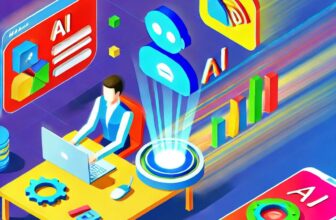As small and medium enterprises (SMEs) look to the future, artificial intelligence (AI) stands as a transformative force reshaping the business landscape. With AI tools becoming more accessible, SMEs can now harness technology previously only available to larger corporations. The integration of AI promises enhanced efficiency, better customer engagement, and data-driven decision-making, poised to redefine competitive advantage. This post explores key trends that SMEs need to watch as they embrace AI solutions to fuel growth and innovation.
Emerging AI Technologies for SMEs
The future of AI in small and medium enterprises (SMEs) is full of potential. New advancements are coming out, making it easier and more affordable for smaller companies to compete with larger ones. These technologies can help businesses streamline operations, understand their data, and reach more customers. Let’s explore some of the key technologies that are making waves in this area.
Natural Language Processing (NLP)
Natural Language Processing, or NLP, is one of the game-changers when it comes to customer service. Imagine an assistant that understands customer complaints and inquiries as if reading them directly. That’s where NLP steps in. It helps in automating
communication, making chatbots and virtual assistants more intelligent. They can engage with customers in real-time, answering questions and solving issues without human intervention. This not only saves time but also ensures that customers aren’t left hanging with their queries.
Machine Learning for Data Analysis
Machine learning is like having a crystal ball for your business data. It deciphers patterns and trends, helping SMEs make decisions based on actual insights rather than guesswork. With machine learning algorithms, businesses can analyze customer behavior, optimize inventory, and even forecast sales. This capability provides SMEs with a competitive edge by aligning their strategies with what’s likely to happen next, rather than what’s already happened.
AI-Powered Marketing Tools

AI isn’t just about working hard; it’s about working smart. In the world of digital marketing, AI tools can customize campaigns like never before. They analyze customer data to create targeted campaigns that reach the right people at the right time. Imagine being able to know exactly what your customers want and giving it to them in a way that feels personalized. That’s the power of AI in marketing. These tools can boost engagement, increase conversion rates, and ultimately drive up sales, making them invaluable for any SME looking to grow.
Trends Driving AI Adoption in SMEs
AI is no longer just for big corporations. It’s becoming a key part of small and medium enterprises (SMEs) too. So, what’s pushing these businesses to jump on the AI bandwagon? Two main trends are really making waves: cutting costs while boosting efficiency and the growing access to AI tools. Let’s explore these in more detail.
Cost Reduction and Efficiency
In today’s fast-paced business world, every penny counts. For SMEs, operating on tight budgets is a way of life. AI offers a silver lining by helping simplify processes and shave off costs. Imagine replacing manual tasks with AI-driven automation—suddenly, the same work gets done faster and with fewer errors. This is like having a super-efficient employee who never gets tired.
- ● Automated Customer Support: AI-powered chatbots are becoming standard. They can handle customer inquiries 24/7, cutting down the need for large support teams.
- ● Inventory Management: AI tools predict stock needs more accurately, reducing the capital tied up in excess inventory and minimizing stockouts.
- ● Predictive Maintenance: For businesses with machinery, AI can predict failures before they happen, saving costly downtime and repair expenses. By automating these day-to-day tasks, SMEs can focus more on strategic activities that drive growth. Increased Access to AI Tools Gone are the days when AI was an exclusive club for tech giants. Now, thanks to advancements in cloud technology and user-friendly interfaces, SMEs have almost the same access to these powerful tools as larger companies do. This democratization of AI means smaller businesses can harness its power without needing a team of data scientists.
- ● Cloud-Based AI Platforms: These platforms offer powerful AI capabilities without the need for massive infrastructure investments.
- ● API Integrations: AI tools can now easily plug into existing systems, making it simpler for SMEs to adopt AI without starting from scratch.
● Affordable AI Software: There’s a growing range of AI software that’s priced for smaller businesses, making it more accessible than ever.
These advances mean more innovation and competition, leveling the playing field and allowing SMEs to thrive. Just think of AI as the ultimate tool giving the little guys the chance to play in the big leagues.
Challenges in Implementing AI
As small and medium enterprises (SMEs) look to embrace Artificial Intelligence (AI), they face several unique challenges. While AI promises to streamline operations and unlock new opportunities, the road to successful integration isn’t all smooth sailing. Here, we’ll explore some of the main hurdles that SMEs encounter in their AI journey, including a skills gap and concerns over data privacy. By addressing these head-on, businesses can transform obstacles into stepping stones.
Lack of Knowledge and Skills
One major challenge is the skills gap. Imagine trying to sail a ship without a map. That’s what implementing AI can feel like for many SMEs without the right expertise on board. The rapid pace of AI development means that many current employees might not have the necessary skills to operate these new technologies.
- ● Training Needs: Simply put, there’s a need for training programs that can bring the workforce up to speed. For SMEs, investing in training might feel like a daunting task, but it’s crucial. Companies could look into online courses, workshops, and even partnerships with tech firms to bridge this gap.
- ● Recruitment Challenges: Hiring skilled AI professionals can be costly, and there’s stiff competition with larger companies. SMEs must think creatively to attract and retain talent, perhaps through offering unique opportunities and a dynamic work environment. Without addressing the knowledge gap, SMEs may find themselves lost in the rapidly evolving technology landscape, unable to harness AI’s full potential. Data Privacy and Security Concerns Next on the list is the issue of data privacy and security. If AI is the engine, data is the fuel. But how do you protect that fuel from being siphoned off or used improperly? It’s a concern many businesses grapple with as they move towards AI.
- ● Protecting Customer Data: Consumers are more aware than ever of how their data is used. Trust is key, and SMEs must ensure that their AI implementations include strong data protection measures to safeguard customer information.
- ● Compliance with Regulations: Navigating the maze of data protection regulations can be overwhelming. Failure to comply not only erodes trust but can also result in hefty fines. SMEs need to stay informed about regional and international data laws to avoid pitfalls. Addressing these concerns is not just about avoiding risks; it’s about building a foundation of trust with customers and ensuring that AI is used responsibly and ethically.
By acknowledging and tackling these challenges, SMEs can pave the way for successful AI integration, making the journey less of an uphill battle and more of an exciting voyage into the future.
Future Predictions for AI in SMEs
Artificial Intelligence (AI) is no longer a mere buzzword. It’s becoming an essential tool for small and medium enterprises (SMEs) that wish to stay competitive. The future of AI in SMEs is packed with potential, and it’s all about integration, customer experience, and beyond. Let’s explore some of the burgeoning trends that SMEs should keep on their radar.
Integration with Other Technologies
AI won’t be working in isolation. It’s poised to create seismic shifts by integrating with other technologies like IoT and blockchain. But how will this work exactly?
- ● IoT (Internet of Things): Imagine a network of smart devices around your business. AI can act as the brain that tells these devices how to work together. From managing inventory to optimizing energy use, AI and IoT together can significantly cut costs and increase efficiency.
- ● Blockchain: We all know blockchain as the tech behind cryptocurrencies. However, when paired with AI, it offers secure, transparent, and efficient processes. Imagine faster transactions and enhanced security measures. It’s like having a digital lockbox that only opens when everything checks out. So, SMEs can mix these technologies with AI for smoother operations, improved security, and better data management. It’s the tech trifecta that could offer a key advantage. Evolution of Customer Experience Remember a time when one-size-fits-all was the norm for customer service? Those days are dwindling.
- ● Personalized Interactions: AI’s ability to analyze customer data means businesses can offer highly personalized experiences. From recommending products based on previous purchases to predicting what a customer might need next, it’s like having a personal shopper who’s always one step ahead.
- ● 24/7 Customer Support: Chatbots are already here, but they’re getting smarter. Soon, they might handle more complex queries with ease. It’s like having your friendly store assistant available any time, whether it’s 3 AM or during a holiday rush.
- ● Faster Resolutions: AI programs can quickly sift through vast amounts of data to find solutions to problems that used to take humans hours to resolve. Imagine a customer service representative who never gets tired and always has the answers. AI is transforming customer experiences from generic to personalized and from static to dynamic. SMEs that harness AI for these improvements can build stronger relationships with their clients and edge out competitors.
So, are you ready to embrace these changes in your business? The clock is ticking, and the future is beckoning.
Conclusion
AI is reshaping the landscape for small and medium enterprises, offering unprecedented opportunities for growth and innovation. Embracing AI technologies is no longer an option; it’s a necessity for staying competitive.
The right tools can enhance customer engagement, streamline operations, and drive data-led decisions. Businesses must act decisively, investing in AI training and resources to fully capitalize on these benefits.
If you’re ready to take your business to the next level, start exploring AI solutions today. The future waits for no one, so gear up and lead the charge.
Share your thoughts in the comments below. How do you plan to integrate AI into your business strategy?





